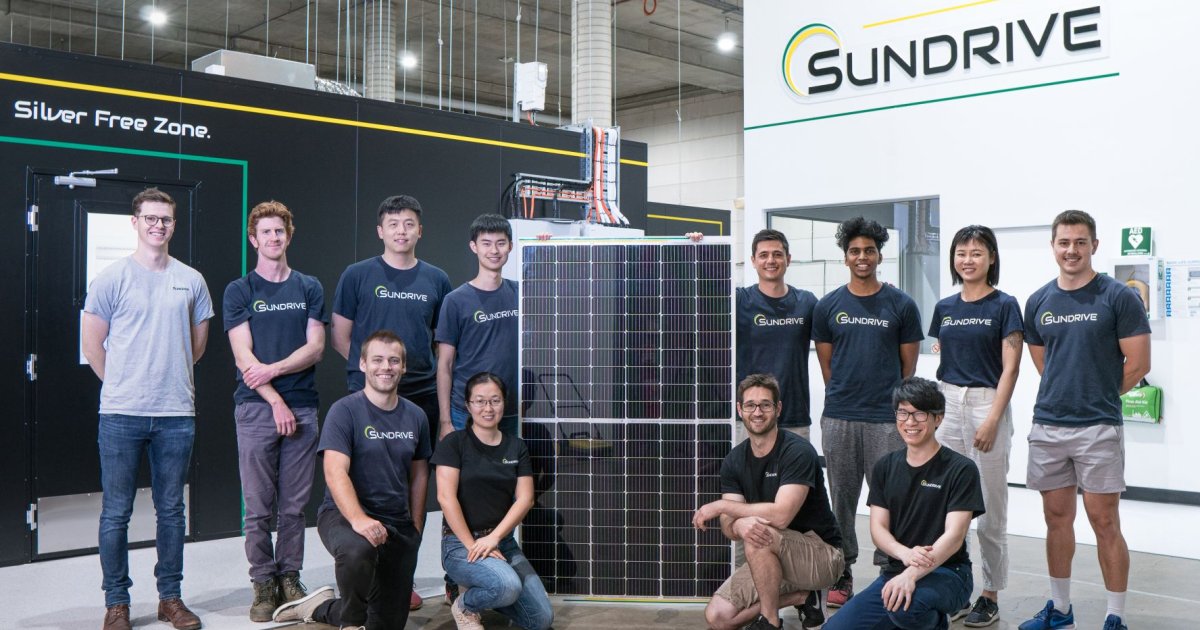If you’re thinking of buying Australian-made solar panels in the future, here’s a company to watch – Sydney-based SunDrive.
Founded in 2015, SunDrive has been quietly working away at developing “a new breed of solar cells” that are more efficient, don’t rely on the use of precious metals such as silver, are less material and energy intensive, and less prone to degradation.
Last October, the Australian Renewable Energy Agency (ARENA) backed the company, kicking in $3 million to support the development of a SunDrive solar panel that could be used on household rooftops. Soon after, SunDrive also scored investment from venture capital fund Blackbird and private investment company Grok Ventures.
In October this year, SunDrive announced it had created what was at that point the world’s most efficient commercial-sized silicon solar cell – independently certified by Germany’s Institute for Solar Energy Research (ISFH) at 25.54%. This just beat a record set by Longi earlier in the year (25.26%).
The improvement may not have been a lot, but this is how solar cell tech evolves – incremental improvements occurring regularly that collectively add up. It was only last month when Longi pulled ahead again with 25.82% for a HJT cell and 26.30% for a Front-Back Contact (FBC) solar cell.
While much higher conversion efficiencies have been achieved for solar cells, that’s been done with other formats, such as multi-junction concentrator cells.
First SunDrive Solar Panel Fabricated
The team haven’t been resting on their laurels since the October achievement. SunDrive made a brief announcement on Wednesday, stating:
“We have successfully fabricated our first ever full-size solar panel! From our process engineers interconnecting every cell to our build team designing the tools to make all this possible, everyone has put in immense effort into making this a reality. We are now gearing up to fully automate our technology as we continue to grow our world class team.”
A few specifications for the SunDrive solar panel would have been nice along with the announcement, but it’s a big step forward for the company. As for growing its team, I noticed SunDrive posted a job ad yesterday for a mechanical engineer.
The SunDrive team seem to be a pretty modest bunch. You won’t find much in the way of press releases from the company hyping up their progress. Being somewhat quiet achievers, probably the best way of keeping tabs on what the company is doing is via the SunDrive LinkedIn profile. There’s also the SunDrive web site for a bit of background on the firm and the people behind it.
When Can You Buy SunDrive Solar Panels?
Not for a while yet. The company is focusing on building a pilot production line by the end of next year and says SunDrive solar panels *may* be ready for market by the first half of 2023.
If that’s too long to wait or you’re keen on buying Australian-made right now, Tindo solar panels are well worth considering – and Tindo has a proven track record.
Australia’s Solid Solar Tech History
Around 90% of solar panels sold around the world today use technology originally developed in Australia. You can learn more about Australia’s leading role in developing breakthrough solar tech in the latest episode of SolarQuotes TV: Episode 11 – The Australian-Made Solar Edition.
Trivia: Among SunDrive’s board members is Dr. Zhengrong Shi, who was the founder of Suntech and is also the founder of SunMan Energy, which manufactures lightweight, flexible eArc solar panels – an interesting bit of kit.
Dr. Zhengrong has strong Australian connections other than SunDrive. He acquired his PhD in electrical engineering from UNSW in 1992, became a fellow of the Australian Academy of Technological Sciences and Engineering in 2009 and an Adjunct Professor at UNSW in 2012. According to SunDrive, he was the first outside investor in their company back in 2015.


 RSS - Posts
RSS - Posts



What would be the purchase cost in replacing batteries for an electric car?
I ask because I do a lot of Km’s, so far I have over 433,000km’s on my petrol car and it is still going strong.
Am I right in thinking if this was an electric car then I would have had the need to replace the batteries twice or would of had to buy another car?
As I mentioned here:
https://www.solarquotes.com.au/blog/top-10-electric-car-myths/
Tesla has found their 100 kilowatt-hour battery packs still average around 89% of their original capacity after 320,000 km. So with the right car your battery pack may still be going strong after 433,000 km.
As for how much a replacement battery would cost, that’s a good question. At the moment the average cost of batteries packs is $186 per kilowatt-hour. If they cost half that by the time you need to replace the battery pack you could get a 100 kilowatt-hour one for under $10,000. So provided they don’t lay on too many extra charges, the cost of replacing a battery pack may be reasonable. But I expect large battery packs to last for hundreds of thousands of kilometres.
Hi Michael,
Some more news today on this company.
https://www.smh.com.au/business/entrepreneurship/tech-billionaires-and-former-pm-back-game-changer-solar-startup-20221012-p5bp5d.html
So great to see this being manufactured in Australia, and with some savvy investors too.
Does SunDrive actually manufacture the panels or assemble them from parts manufactured in China?